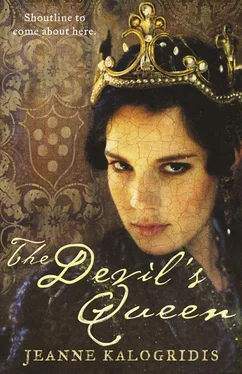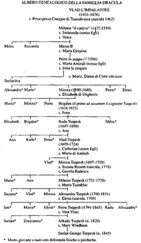JEANNE KALOGRIDIS

This novel is entirely a work of fiction. The names, characters and incidents portrayed in it are the work of the author’s imagination. Any resemblance to actual persons, living or dead, events or localities is entirely coincidental.
Harper Collins Publishers Ltd. 1 London Bridge Street London SE1 9GF
www.harpercollins.co.uk
First published in Great Britain by HarperColins Publishers 2010
Copyright © Jeanne Kalogridis 2010
The Author asserts the moral right to be identified as the author of this work
A catalogue record for this book is available from the British Library
All rights reserved under International and Pan-American Copyright Conventions. By payment of the required fees, you have been granted the non-exclusive, non-transferable right to access and read the text of this ebook on-screen. No part of this text may be reproduced, transmitted, down-loaded, decompiled, reverse engineered, or stored in or introduced into any information storage and retrieval system, in any form or by any means, whether electronic or mechanical, now known or hereinafter invented, without the express written permission of Harper Collins ebooks
HarperCollins Publishers has made every reasonable effort to ensure that any picture content and written content in this ebook has been included or removed in accordance with the contractual and technological constraints in operation at the time of publication
Source ISBN: 9780007266838
Ebook Edition © NOVEMBER 2011 ISBN: 9780007283460
Version: 2016-09-26
For Russell Galen
Cover
Title Page
Copyright
Dedication
PART I: Blois, France August 1556
Prologue
PART II: Florence, Italy May 1527
One
Two
Three
Four
Five
PART III: Imprisonment May 1527–August 1530
Six
Seven
Eight
Nine
Ten
Eleven
PART IV: Rome September 1530–October 1533
Twelve
Thirteen
Fourteen
Fifteen
PART V: Princess October 1533–March 1547
Sixteen
Seventeen
Eighteen
Nineteen
Twenty
Twenty-one
Twenty-two
Twenty-three
PART VI
Twenty-four
Twenty-five
Twenty-six
Twenty-seven
Twenty-eight
Twenty-nine
Thirty
Thirty-one
PART VII
Thirty-two
Thirty-three
Thirty-four
Thirty-Five
Thirty-Six
Thirty-Seven
Thirty-eight
Thirty-nine
Forty
Forty-one
Forty-two
Forty-three
Forty-four
Forty-five
Forty-six
Epilogue
Afterword
Keep Reading
Acknowledgements
About the Author
Also by Jeanne Kalogridis
About the Publisher
Blois, France August 1556
At first glance he was an unremarkable man, short and stout with graying hair and the drab clothes of a commoner. I could not see his face from my vantage two floors above, but I watched him recoil as he emerged from the carriage and his foot first met the cobblestone; he signaled for his cane and reached for the coachman’s arm. Even with these aids, he moved gingerly, haltingly through the sultry morning, and I thought, aghast, He is a sick, aging man—nothing more.
Behind him, clouds had gathered early over the river, promising an afternoon storm, but for now the sun was not entirely occluded. Its rays slipped through gaps and reflected blindingly off the waters of the Loire.
I receded from the window to settle in my chair. I had wanted to dazzle my summoned guest, to charm him so he would not detect my nervousness, but I had no heart in those days for pretense. I sported mourning, black and plain, and looked anything but grand. I was a thick, unlovely creature, very worn and very sad.
Thank God they are only children, the midwife had muttered.
She had thought I was sleeping. But I had heard, and understood: A queen’s life was valued more than those of her daughters. And they had left behind siblings; the royal bloodline was safe. But had I not been drained of blood and hope, I would have slapped her. My heart was no less broken.
I had approached my final attempt at childbirth without trepidation; the process had always gone smoothly for me. I am strong and determined and have never feared pain. I had even chosen names—Victoire and Jeanne—for Ruggieri had predicted I would have girl twins. But he had not told me they would die.
The first infant was long in coming, so long that I and even the midwife grew anxious. I became too tired to sit in the birthing chair.
After a day and half a night, Victoire arrived. She was the smallest infant I had ever seen, too weak to let go a proper wail. Her birth brought me no respite; Jeanne refused to appear. Hours of agony passed, until night became day again, and morning led to afternoon. The child’s body was so stubbornly situated that she would not pass; the decision was made to break her legs so that she could be pulled out without killing me.
There followed the midwife’s hand inside me and the dreadful muffled snap of tiny bones. I cried out at the sound, not at the pain. When Jeanne emerged dead, I would not look at her.
Her sickly twin lived three weeks. On the day Victoire, too, succumbed, a cold, prickling conviction settled over me: After all these years, Ruggieri’s spell was failing; my husband and surviving children were in mortal danger.
There was, as well, the quatrain in the great tome written by the prophet, the quatrain I feared predicted my darling Henri’s fate. I am dogged in the pursuit of answers, and I would not rest until I had learned the truth from the lips of the famed seer himself.
A knock came at the door, and the guard’s low voice, both of which drew me back to the present. At my reply, the door swung open and the guard and his limping charge entered. The former’s expression grew quizzical at finding me entirely alone, without my ladies to attend me; I had busied Diane elsewhere, and had dismissed even Madame Gondi. My conversation with my visitor was to be strictly private.
“Madame la Reine.” The seer’s accent betrayed his southern origins. He had a soft moon of a face and the gentlest of eyes. “Your Majesty.”
Madame Gondi said that he had been born a Jew, but I saw no evidence of it in his features. Unsteady even with his cane, he nonetheless managed to doff his cap and execute a passable genuflection. His hair, long and tangled and thinning at the crown, hung forward to obscure his face.
“I am honored and humbled that you would receive me,” he said. “My greatest desire is to be of service to you and to His Majesty in whatever manner most pleases you. Ask for my life, and it is yours.” His voice shook, and the hand that gripped the cap trembled. “If there is any question of impropriety, of heresy, I can only say that I am a good Catholic who has endeavored all my life to serve God. At his bidding, I wrote down the visions. They are sent by Him alone, and not some unclean spirit.”
I had heard that he had often been accused of consorting with devils, and had moved from village to village over the past several years to avoid arrest. Frail, vulnerable, he regarded me with hesitation. He had read my letter, yet he had no doubt heard of my husband the King’s hatred for the occult and for Protestants; perhaps he feared that he was walking into an inquisitional trap.
Читать дальше













